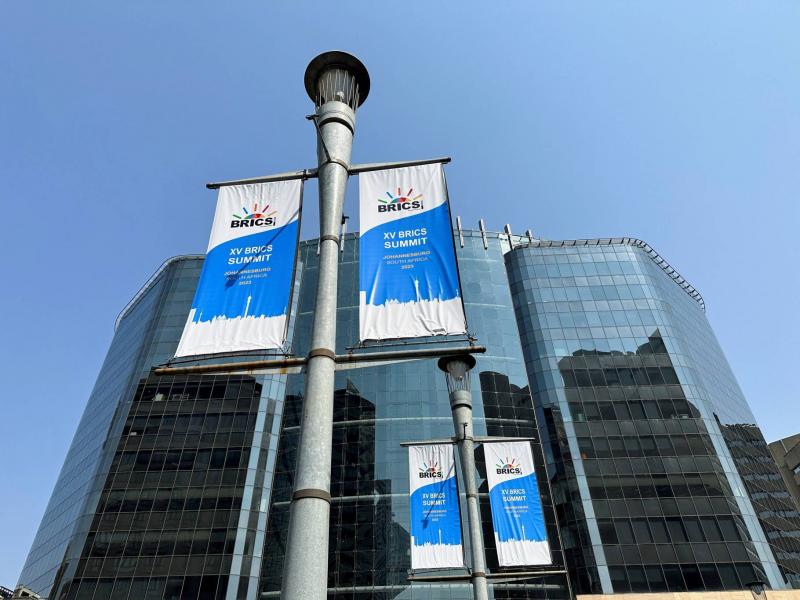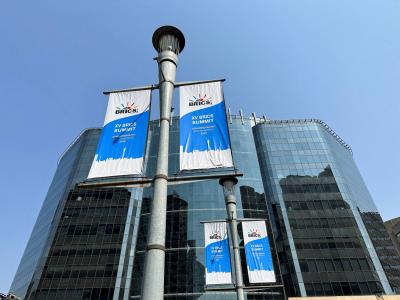Today, Tuesday, BRICS leaders gathered in Johannesburg for a summit to discuss the expansion of the group as some members seek to transform it into a counterbalance to the West, amidst international divisions fueled by the war in Ukraine. The summit includes leaders from China, India, Brazil, and South Africa, while Russian President Vladimir Putin addressed the summit via video link, represented by Foreign Minister Sergey Lavrov. Putin delivered his message remotely due to an arrest warrant issued against him by the International Criminal Court in March for alleged kidnapping of children from Ukraine. During his speech, he expressed Russia's readiness to return to the grain deal if real commitments are fulfilled towards Russia.
Regarding the grain deal, he stated in his speech at the BRICS Business Forum that "none of the conditions of the so-called grain deal regarding the lifting of sanctions on Russian grain and fertilizer exports to global markets have been implemented." He added: "Obligations to Russia in this regard have simply been ignored. They even prevented us from transferring mineral fertilizers held in European ports for free, despite this being purely humanitarian work, and we should not be subjected to any sanctions in principle." He continued, "Considering the aforementioned facts, since July 18, we have refused to extend this so-called agreement and will be ready to return to it, but only if all obligations towards the Russian side are realistically and genuinely fulfilled." The Russian president described the process of phasing out the U.S. dollar in economic relations between BRICS countries as "inevitable and irreversible." He stated that "the objective, irreversible process of eliminating dependence on the dollar in our economic relations is gaining momentum, and efforts are being made to develop effective mechanisms for mutual settlements and monetary and financial control." According to Putin, the share of the U.S. dollar in export and import operations among group members has steadily declined, reaching only 28.7% last year.
South Africa hosted Chinese President Xi Jinping, the main supporter of BRICS expansion, for an official visit on Tuesday morning before meetings with other group leaders. Xi affirmed that "the Chinese economy is solid and the fundamentals of its long-term growth have not changed." His statement was delivered in a prepared speech read by Chinese Commerce Minister Wang Wentao at a BRICS Business Forum. The slow recovery of the Chinese economy post-COVID-19 raises global concerns, especially in oil markets, as it indicates potentially weak demand from the world's largest crude importer.
South African President Cyril Ramaphosa, who sat alongside Xi, noted that the two countries have "similar views" regarding expansion. Ramaphosa added, "We share your view, President Xi, that BRICS is a highly important forum and plays a crucial role in reforming global governance and promoting multilateralism and cooperation around the world." Brazilian President Luiz Inácio Lula da Silva and Indian Prime Minister Narendra Modi are also attending the summit, which spans from August 22 to 24. Shortly after arriving in South Africa, Xi expressed confidence that the upcoming summit would be a significant stage in developing the BRICS mechanism.
In addition to the expansion issue, the summit agenda also covers enhancing the use of local currencies among member states. However, South African organizers noted that the discussion of a BRICS currency, proposed by Brazil earlier this year as an alternative to reliance on the dollar, will not take place.
BRICS remains a diverse group of countries, ranging from China, the world's second-largest economy currently experiencing a slowdown, to South Africa, the economically weakened host nation facing a daily energy crisis. India is enhancing its alignment with the West, as is Brazil under its new leader, while Russia suffers from Western sanctions due to its war in Ukraine. Tensions occasionally arise between India and China along their disputed border, complicating decision-making in a group reliant on consensus.
Expansion has long been a goal for China, hoping that broader membership will provide leverage to a group that already accounts for about 40% of the world's population and a quarter of global GDP. Leaders are participating in a closed meeting and dinner on Tuesday evening, likely discussing the framework and criteria for accepting new countries. However, expansion has become a point of contention. Russia is keen on adding new members to counter its diplomatic isolation due to its invasion of Ukraine. Indian Foreign Minister Vinay Kwatra expressed on Monday that India, concerned about Chinese dominance and cautioning against hasty expansion, has "positive intentions and an open mind." Brazil fears that BRICS expansion might weaken the group’s influence. However, the potential expansion of the BRICS group remains uncertain, with the group's intent to become a champion of the developing "Global South" and offer an alternative to the Western-dominated world order already resonating. South African officials indicated that more than 40 countries have expressed interest in joining BRICS, with over 20 of them formally requesting membership and expectations of other countries sending delegations to Johannesburg.
The summit, spanning three days under the theme "BRICS and Africa," is particularly significant amid Russia's war in Ukraine and the geopolitical conflict between the United States and China, as member countries advocate for a more balanced and secure world and call for the end of unipolarity. This year’s summit agenda will include future membership expansion possibilities, which the bloc has previously shown openness to. The name "BRICS" is derived from the first letters of its member countries' names in English: Brazil, Russia, India, China, and South Africa.
In the White House’s first comment on this summit, National Security Advisor Jake Sullivan noted that the United States does not see the BRICS group becoming a geopolitical competitor to it or any other country. He added in a press briefing, "This is a diverse group of countries... they have differences in views on critical issues."




